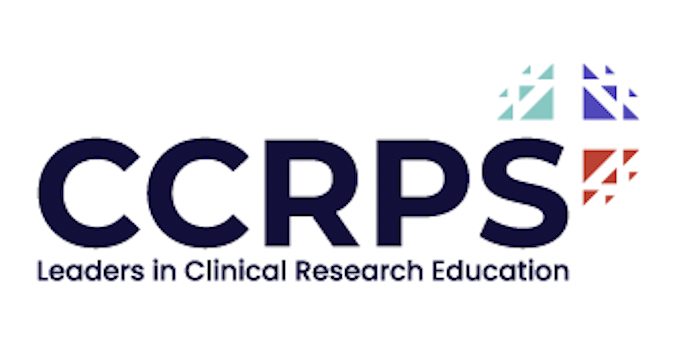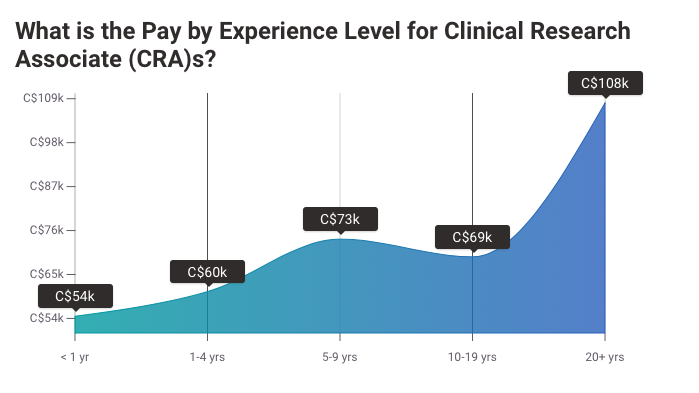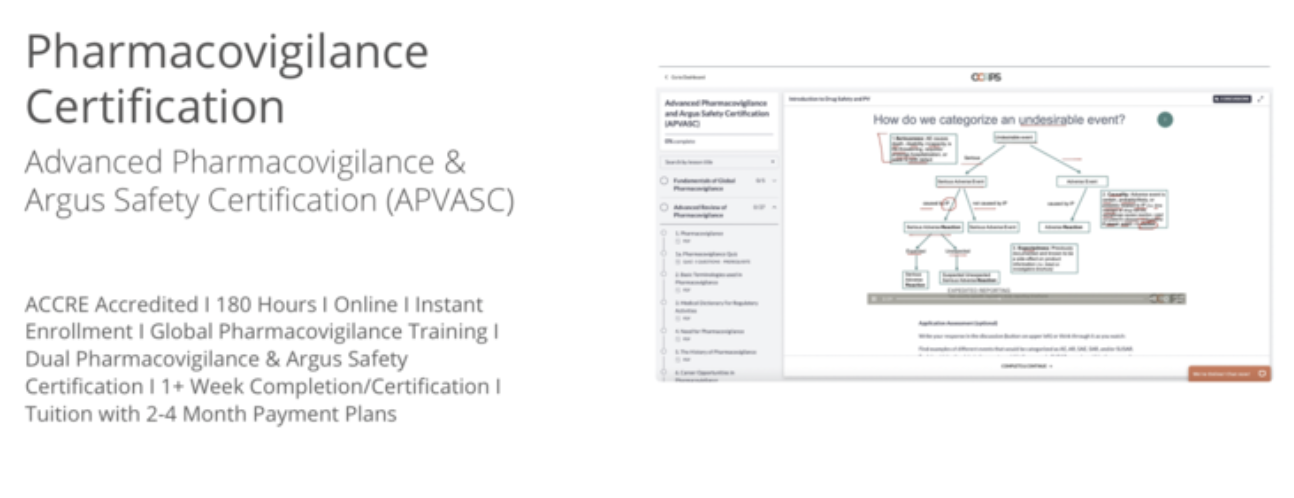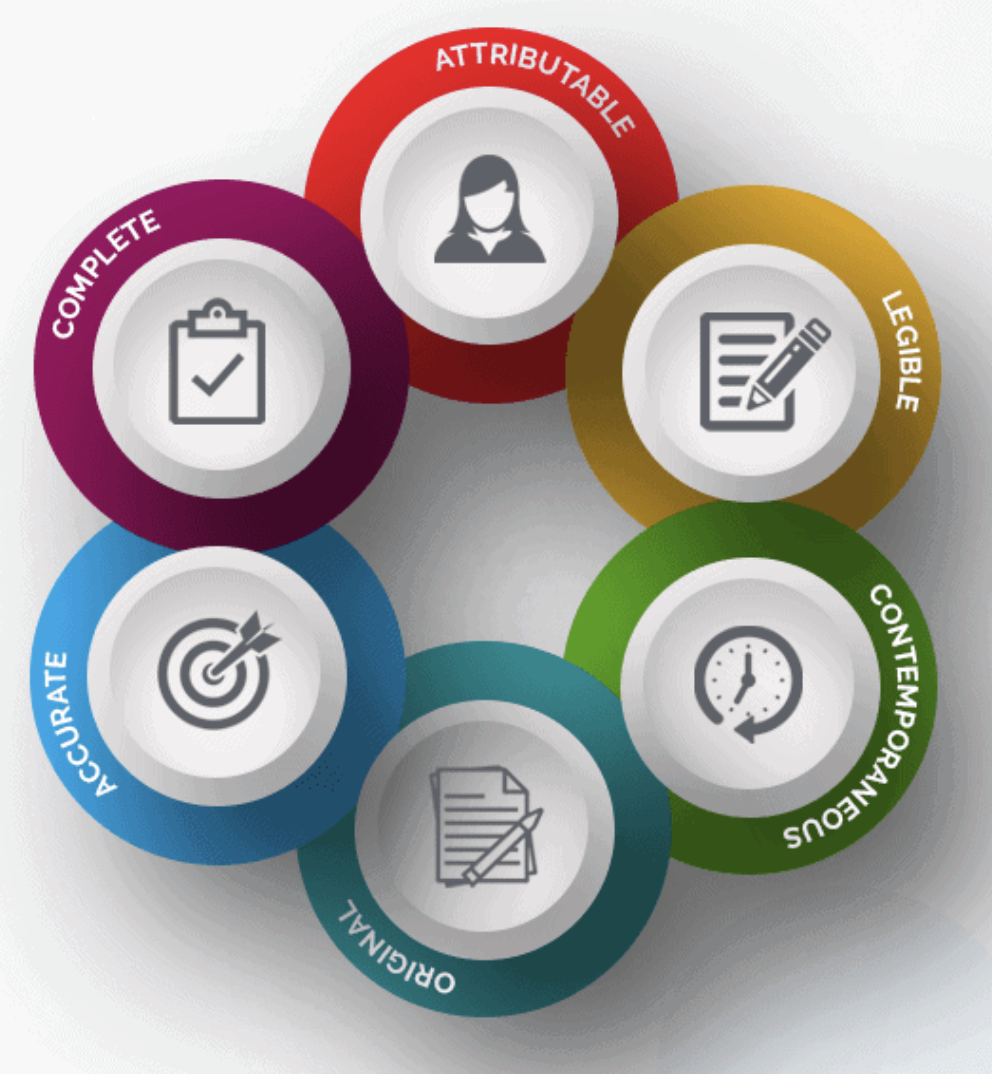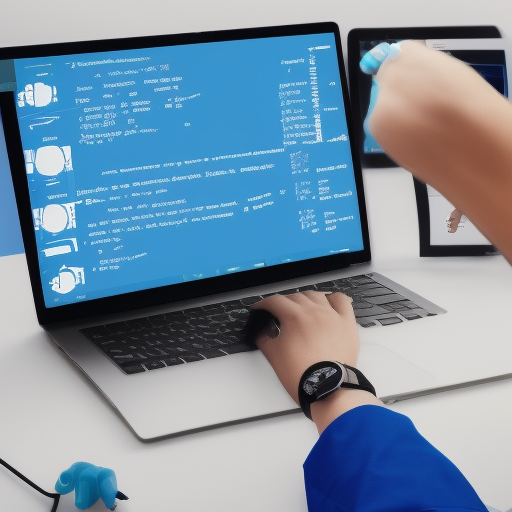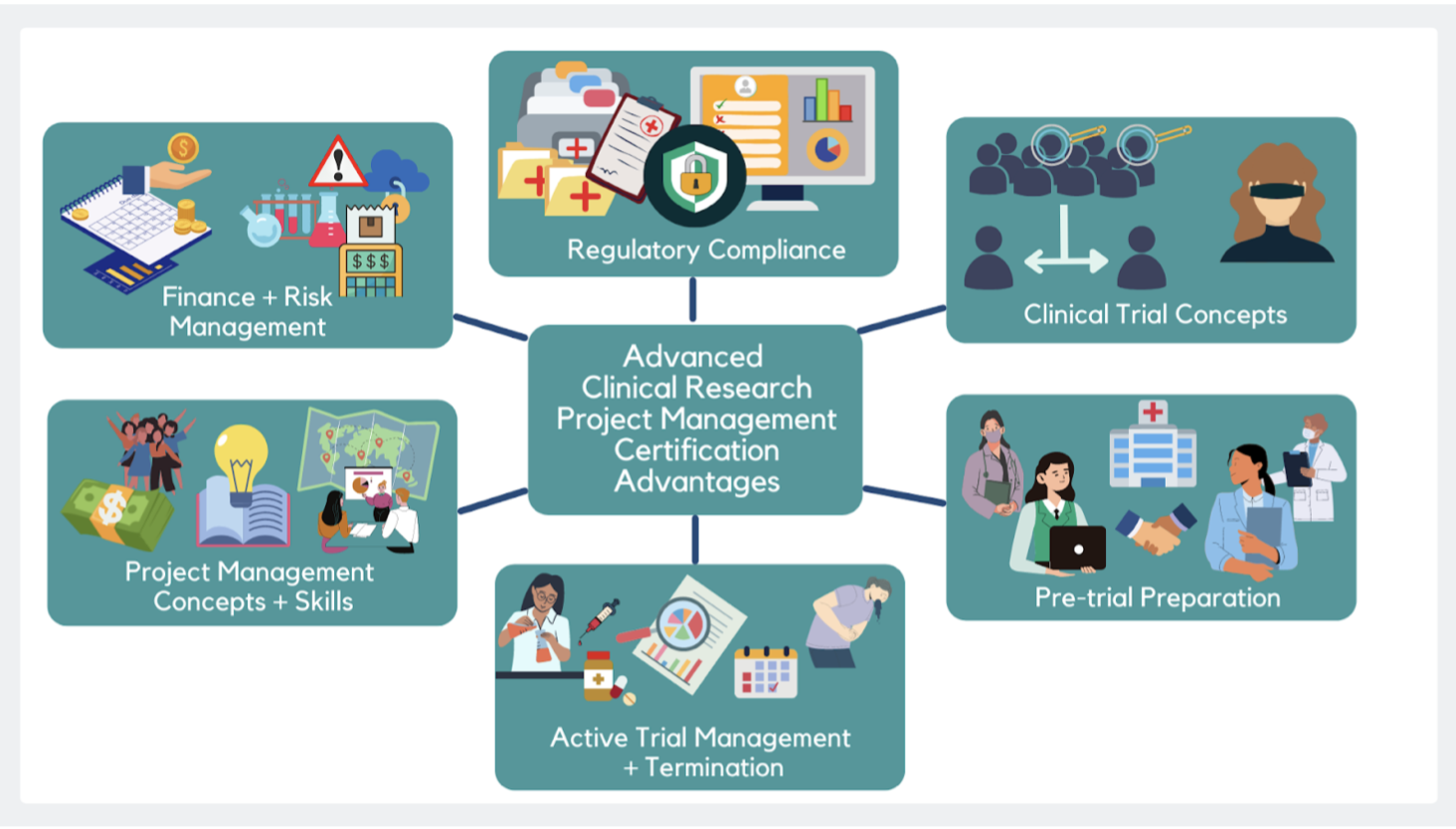Why Do People Choose Online Clinical Training Courses?
People wish to have the perfect platform to perfect their clinical research. As the clinical training program courses become more popular among people, in some cases there are people who simply choose clinical research training courses without knowing its roles and responsibilities.
When people decide to pursue clinical research course, there are several available ways, such as the Clinical Research Coordinator and Pharmacovigilance Certification courses offered at CCRPS.
Although there are many clinical research institutes, most prefer taking clinical research training programs to make their career stronger in the medical field. This is mainly because when people choose courses in clinical research institution or any research centers, it would costs $30,000 to $ 50,000 while online courses like the CRA and ICH-GCP certifications cost much less.
Facilities provided in clinical research training in institutes:
You must be wondering how an online course might differ from a physical course. Online training courses are very similar to the courses offered in clinical research institutes. People can choose their desired specialization and attend daily sessions. Once they have completed all sessions and passed the course examination, they receive a course completion certificate such as the Clinical Trials Assistant Training.
Although the online clinical courses are similar to the courses offered in clinical research institutes, there are some facilities which are offered only in the clinical research institutes and research centers:
In clinical training institute, students can experience clinical research operations with patients.
Students are allowed to do test on various drugs and medicine, analysis them in traits test center.
Based on the analysis test report, student can learn to decide whether the drugs are safe for market use or need to be sent for further analysis.
These facilities are only provided to people that choose clinical research courses from clinical research centers and institutes. These skills and experiences might be important to potential employers, so be sure to check the requirements on all job postings. For more details regarding this you can check on Advanced Clinical Research Project Manager Certification and Advanced Principal Investigator Physician Certification or visit us to learn more about our Medical Monitor Certification.
Take courses from CCRPS and learn more on how to become a clinical research professional.
Discover more from Clinical Research Training | Certified Clinical Research Professionals Course
What Made Clinical Research Courses Popular in the Medical Field?
When students wish to have a strong career in the interesting medical field, they often become clinical researchers. The clinical researcher career is a popular choice because it brings several career as well as financial benefits. However, when you decide to choose clinical researcher as a career, then you should be aware of the roles and responsibilities involved in them.
Since there are so many available clinical research training programs, it is important that people know what roles and what specialization they want to go into. For example, when people complete their course or training programs from licensed centers, they could get clinical research organization jobs in pharmaceutical companies, medical research organizations, and in clinics. Although there are many courses available, people who knew going into training knowing exactly where they wanted to work would benefit more from their classes. You can start with a specific role by enrolling in the Clinical Research Coordinator course or explore specializations such as Pharmacovigilance Certification and CRA Training.
Due to the popularity of the field, those who get their Master’s in Clinical Research have an advantage. Their degree could get them better positions and pay than their counterparts. For those looking to solidify their knowledge of good clinical practices, the ICH-GCP course is essential.
Many people show an interest in completing their Master’s in Clinical Research, but in real life getting a Master’s in Clinical Research is not easy. In order to complete the course, people would need $30,000 to $50,000. Course from the top research centers would cost even more.
To tackle this situation, most people look to get their Master’s in Clinical Research online. Many wonder if online courses would be on par to trial centers training. The answer is that when students decide to do their Master’s in Clinical Research online, they find that the courses are very similar to classroom training.
Moreover, by taking online courses people can avoid several additional costs like travel, high tuition, and taking time off work. The only thing that is different is that in an online master’s course, people can’t experience hands-on training with patients, drugs, and medicines. This gap can be bridged by courses like Clinical Trials Assistant Training, which provide a comprehensive understanding of clinical trial processes.
When deciding to pursue an online masters, below are some other information you should consider:
There are many training centers that offer online Master’s in Clinical Research with low tuition fees. So people need to compare and choose the best among them.
Check whether the training center provides clinical research quality assurance training across all specializations. This speaks to the quality and comprehensiveness of the courses offered. Advanced courses like Advanced Clinical Research Project Manager Certification and Advanced Principal Investigator Physician Certification can be crucial for career advancement.
While comparing centers based on their courses, check whether the center would offer help with job placements too.
Before committing to anything, check jobs near you to see if an online course completion certificate is valid for the posting.
Thus based on all above factors, you can confidently choose the best clinical research training institute to pursue your Master’s in Clinical Research.
Take courses from CCRPS and learn more on how to become a clinical research professional.
Discover more from Clinical Research Training | Certified Clinical Research Professionals Course
A Career as a Clinical Researcher and Its Benefits
Clinical research is a multidisciplinary, multinational and multi billion industry. Now days the pharmaceutical industries, one of the top employers for clinical research work, are becoming a fastest growing sector that boosts the economy of the clinical research to the rapid development. As compared to the previous years the clinical research field has undergone a remarkable evolution in the power, sophistication and scope on its methodologies. There is a remarkable change in the approach to the data analysis, data collection and experimental design where these are found to be the basis for the strong clinical research career. It is the next big thing that will create a wider scope of job opportunities in the field of life science. To enhance your understanding of good clinical practices, consider enrolling in the ICH-GCP course.
Numerous advances topics and opportunities are cited in the clinical research graduate programs. This helps individuals learn about new developments in the field. The following are the some of the benefits of completing the graduate program in the field of clinical research. They are:
When you complete the graduate program in the clinical research, you qualify for positions that have significantly better non financial and monetary benefits than other areas of the industry.
You will typically enjoy a high base salary and expect an annual bonus from the company. Depending on your position, the company will typically be providing the vehicle facility for personal usage too.
You will be also getting the food allowances and health insurance profits. The company will also be providing you the gadgets like a mobile phone, laptop and all in one printer for working from home/remote working.
When you have the knowledge and skills from the clinical research education program, you have the opportunity to work with other high skilled staffs as well as the perfect work and life balance. Consider the Clinical Trials Assistant Training to start your journey.
How to obtain a career in the field of clinical research
Clinical research is an expanding area of the work that is gradually generating the more interest for many people. Fortunately, there are countless opportunities in clinical research for the doctor of nursing practice and anyone can pursue a career in the field of the clinical research.
One of the most important benefit of pursuing a clinical research program is the wide range of jobs vacancies that are available in this field. If you're looking to enhance your career, check out the Clinical Research Coordinator course or the Pharmacovigilance Certification.
Some of the typical tasks in clinical research is taking part in the development planning, project management, management and site selection, feasibility studies, development planning, and project management. In order to get into this clinical research profession it is important to have the degree in any of the following subjects like medicine, nursing, biology, immunology, dentistry, chemistry, and pharmacology. These fields are where most of the clinical roles and jobs are available. You can check here to check out positions available near you. For more details and training you can check ccrps.org. Enhance your skills with specialized training such as the Advanced Clinical Research Project Manager Certification or the Advanced Principal Investigator Physician Certification.
Take courses from CCRPS and learn more on how to become a clinical research professional.
Discover more from Clinical Research Training | Certified Clinical Research Professionals Course
Everything You Should Know About CTRI UCSD
The UC San Diego Altman Clinical and Translational Research Institute, better known as CTRI UCSD, acts as the hub for translational medicine. It helps in delivering the scientific breakthrough patient care through clinical trials.
They offer participants early access the treatments, which would one day re-define the standards of care. Every year, the clinical research volunteer program would enroll the participant with the hundreds of the clinical trials for promising the investigational drugs, devices and the treatments.
If you want to become part of a research institute like CTRI UCSD, clinical research education can help you.
Become well versed in the field that you really like.
Pave a way for you to shine and know about the field.
Helps you to do more research work based on the type of the field that you have chosen.
Things that you want to know about clinical research
The clinical research acts as the branch of the healthcare science. If you are interested in the field, doing the clinical research online training program that is associated up with clinical research associates (CRA), clinical research coordinators (CRC), or clinical trial assistants (CTA) could be a great way to get started.
Different research training programs could vary based on the student locations, time and the learning demands. However, CCRPS’ self paced online modules is reliable and contain interactive tutoring sessions that promotes monitored competency. Classes provide the foundation that will help you break into the field.
The ccrps.org paves a way for you to get trained up in the clinical research. Before choosing it, you can go through all the reviews that are available to give you a better idea of our courses. To know more details about it you can gather the information for training in clinical research here.
Take courses from CCRPS and learn more on how to become a clinical research professional. Explore our specialized certifications like Advanced Clinical Research Project Manager Certification, Advanced Principal Investigator Physician Certification, and Medical Monitor Certification.
Discover more from Clinical Research Training | Certified Clinical Research Professionals Course
2019 Clinical Research Salaries
Want to know how much a clinical research job post salary. Read our blog post for clinic research job post salary. Here you can get the info about the post description and salary numbers.
The average salary for clinical research professionals is $63,000, but there are lots of different clinical research professionals in the clinical research industry and we will be taking them one by one to see their differences in salaries.
Clinical Research Associate (CRA)
CRAs earn $63,030 annually on average. Most join as junior clinical research associates (CRAs). They learn the life cycle of a clinical trial, how to monitor the clinical trial activities at different stages, and everything about clinical data monitoring and management. To further explore a career as a CRA, consider the CRA Certification course.
Clinical Research Coordinator (CRC)
CRCs earn $48,739 annually on average. The clinical research coordinator is responsible for conducting trials and carrying our research objectives. Most significantly, CRCs are usually engaged in vital duties for the PI, like taking care of the informed consent process and making sure that the site staff is in compliance with the protocol. The CRC’s main responsibility, as with all clinical research staff, is to ensure the protection and well-being of the patients participating in the study. Learn more about becoming a CRC with this Clinical Research Coordinator course.
Senior Clinical Research Associate (CRA)
SCRAs earn $97,813 annually on average. The senior CRAs deal with more complex clinical trials and site management issues than junior CRAs. They are there to highlight the importance of international research as well as the role of the ICH GCP process. They also give updates on the overview of current legislative requirements, including guidance on substantial trial modifications, improving the recruitment process of subjects and site staff, as well as how to prioritize and upgrade clinical trial monitoring tasks and activities, accurate monitoring and reporting.
Biostatistician
Biostatisticians earn $70,732 annually on average. They are involved in every step of clinical research, including trial design, protocol development, data management, and monitoring, data analysis and clinical trial reporting. They are also involved in data management protocol development and design study implementation data analysis and reporting and study monitoring.
Clinical Project Manager
CPMs earn $84,048 annually on average. The job of a CPM includes planning and managing all aspects of a clinical trial. In order to conduct a clinical trial adequately, CPMs manage a team of CRAs and Clinical Specialists and act as a link between the study sponsor and the clinical trial site. Advance your career with this Advanced Clinical Research Project Manager Certification.
Take courses from CCRPS and learn more on how to become a clinical research professional. Explore a variety of specialized roles within the field through additional certifications like Clinical Trials Assistant Training, Advanced Principal Investigator Physician Certification, and Medical Monitor Certification.
Discover more from Clinical Research Training | Certified Clinical Research Professionals Course
Clinical Research Quality Assurance
For a career in clinical research quality assurance, understanding internal, national and international regulations in every aspect of clinical development is absolutely essential. Legal setbacks can be dangerous for patients, extremely costly, and highly damaging to a company’s reputation. Therefore, the role of the Good Clinical Practice QA professional is a high profile one and can offer excellent opportunities for development. However, it can be a tricky area to get into. Enhance your understanding and skills with an ICH-GCP course.
Just as in clinical operations, as your QA career develops you will normally become more office based; seeing to the work of audit teams, developing audit strategies and plans and ensuring a culture of compliance in your own organization as well as the ones you’re in partnership with.
You will also gain exposure to other areas of QA, such as Good Pharmacovigilance Practice (GPvP), Good Laboratory Practice (GLP) and Good Manufacturing Practice (GMP). Experience in more than one QA specialization will make you more attractive to potential employers. For instance, GPvP experience is particularly sought after these days. Consider enrolling in a Pharmacovigilance Certification to enhance your credentials in this area.
Many people choose to go down the interim path as their QA careers develop, opting for either short-term, ad-hoc work to complete individual projects for a range of clients or to take longer-term contracts that offer more security but at a lower pay rate.
The right personality is crucial to success in the QA world. Thankfully the days of QA groups being seen as ‘other’ in most companies are long gone.
You will be expected to train staff from a wide variety of disciplines, answer QA related queries and, on occasion, deal with some difficult situations. Very strong interpersonal and communications skills, a high degree of tact and knowledge in different areas is essential to the job. Expand your capability with Clinical Research Coordinator training or a Clinical Trials Assistant Training course.
HOW MUCH DOES A CLINICAL QUALITY ASSURANCE MANAGER MAKE?
The national average salary for a Clinical Quality Assurance Manager is $98,393. Salary estimates are based on 4,654 salaries submitted anonymously by clinical quality assurance manager employees.
Take courses from CCRPS and learn more on how to become a clinical research assurance manager. Specialized certifications like the Advanced Clinical Research Project Manager Certification or the Advanced Principal Investigator Physician Certification can propel your career forward.
Discover more from Clinical Research Training | Certified Clinical Research Professionals Course
Also, check out the CRA course for further qualifications, and the Medical Monitor Certification to explore other high-demand roles in clinical research.
Common Questions For a Clinical Research Project Manager
Get the right Clinical research project manager job with company ratings & salaries. Visit now!
Research project managers (PMs) are responsible for leading research projects to a defined business or scientific objective. To reach this goal, research project managers utilize different methodologies and techniques for managing and guiding the development of research instruments. They are also in charge of evaluating research related fieldwork, validating collected data, authoring reports and communicating across various research constituencies.
What responsibilities does a clinical project manager job have?
CPM jobs involve planning and managing all aspects of a clinical trial. The aim of clinical trials is to evaluate the safety and effectiveness of pharmaceuticals, medical devices, or in-vitro diagnostic devices to support regulatory submissions or marketing claims.
In order to manage a clinical trial adequately, CPMs manage a team of CRAs and Clinical Specialists. They also act as a link between the study sponsor and the clinical trial site. As a CPM, it is important to understand project management methodologies, like those taught in the Advanced Clinical Research Project Manager Certification. They will allow you to effectively lead a cross-functional team.
Analytical and writing skills are also very important, because a CPM job will involve developing documents such as protocols, informed consent documents, contracts, and grants. A skilled CPM should also be familiar with the financial aspects of a clinical study, including reviewing invoices, performing daily accounting tasks, and preparing budgets. Sometimes, clinical research manager jobs may include contributing to the statistical analysis and data reporting documentation used to support a marketing clearance, approval or registration.
How much do CPMs earn?
The average clinical research manager salary is $75,474 in the United States.
What is the demand for CPMs?
Demand for CPMs increases, as there are increased global regulations requiring more extensive clinical studies to support the safety and effectiveness claims of health-care products. CPMs may work for pharmaceutical, medical device, or in-vitro diagnostic device companies. CPMs may also work for contract research organizations (CROs)- an organization that is hired to outsource clinical trials or perform other clinical research support.
What qualifications or training do I need as a CPM?
CPM can come from different educational backgrounds and fields. Most have, at a minimum, a bachelor’s degree in a sciences field such as biology, health, life sciences or bioengineering. Those with advanced degrees such as MS, MBA, Ph.D. or MD will find it easier and faster to reach the CPM position, as long as they have relevant clinical trial and project management experience.
As a CPM, you will be working in a highly regulated environment and should have an expert understanding of Good Clinical Practice (ICH-GCP) and other relevant regulatory requirements. You should also have exposure working with institutional review boards (IRBs) or ethics committees (ECs).
Generally, a principle CRA with about 7-9 years of experience would be a strong candidate for a CPM position. A position as a clinical team lead, clinical team manager, or clinical operation leader would also serve as an excellent transition towards becoming a CPM. These positions offer valuable clinical leadership and management experience without some financial management responsibilities, such as budgeting.
Take courses from CCRPS and learn more on how to become a clinical research project manager.
Discover more from Clinical Research Training | Certified Clinical Research Professionals Course
2020 Clinical Research Internships
We provide clinical research internship which is follow the health policy related to clinical trials, research transparency. To know about the internship visit us now!
International Clinical Trials Registry Platform (ICTRP)
The International Clinical Trials Registry Platform (ICTRP) has a strong internship program which welcomes interested and enthusiastic students, professionals, and researchers from a wide range of disciplines. Internships with the ICTRP are flexible and tailored to individual learning goals to provide interns with the best possible experience with the ICTRP at the World Health Organization.
Internships with the ICTRP provide an excellent opportunity to participate in the work of health policy related to clinical trials, research transparency, and knowledge sharing.
Yale University – New Haven, CT
An internship that provides an opportunity to develop professional skills in a wide variety of fields and to support various university initiatives. Observes and gains expertise in applicable areas. Assists and completes various projects, programs, and assignments.
Essential Duties:
Working with and shadowing senior clinical research faculty in clinical research Human subject protection and regulatory training
Meeting regularly with faculty and receive mentoring
Working with regulatory and subject recruitment units
Rotations in inpatient and outpatient research clinics
Yale Center for Clinical Investigation Internship Program
Vanderbilt School of Medicine - Nashville, TN
The Vanderbilt Undergraduate Clinical Research Internship Program (UCRIP) offers college students earning a four-year degree the opportunity in research and clinical patient care at the academic medical center. This program is designed for students who are interested in a career in medicine.
Participants will design and complete research project from June to July, presenting results at the end of the program. The project may be in clinical or bench science research. Participants will be placed under the directorship of a research mentor. In addition, they will be spending time with residents and attending physicians.
Undergraduate Clinical Research Internship Program
NYU Langone Health - NYC, NY
This program is open to undergradute as well as post-baccalaureate students. The program is created by the Ronald O. Perelman Department of Emergency Medicine and consists of clinical and non-clinical research shifts based in the Emergency Department.
RA interns will:
develop basic research skills
be taught how to collect and enter data, and maintain databases
participate in laboratory meetings
gain Principal Investigator mentor-ship and/or shadowing experiences
RA interns will also become oriented to the Institutional Review Board and other Human Subjects courses
Take courses from CCRPS and learn more on how to become a clinical research professional.
Discover more from Clinical Research Training | Certified Clinical Research Professionals Course
Top 3 Clinical Research Blogs For Students and Professionals
WHAT IS A CLINICAL RESEARCH STUDY?
A clinical study is medical or drug research that involves research using human volunteers (also called participants). There are two main types of clinical studies: clinical trials (also called interventional studies) and observational studies.
Here’s a selection of the top clinical research blogs that will help you stay up-to-date with the latest industry trends, topics, and research breakthroughs:
Improving patient recruitment methods through the interpretation of actual clinical trial data is the then goal of Placebo Control, as you continue to read the posts in Placebo Control, you’re enlightened by Paul’s ideas, insights, and possibilities that could potentially reshape the industry.
I think the main thing that makes this blog unique is receiving direct insights from industry executives themselves. You’ll also see a lot of commentaries, reports, and arguments from experts
A blog that’s strictly professional. Dan Sfera originally started this blog to attract study participants for his research. What happened instead was totally unexpected. Surprisingly, Dan received a lot of comments and inquiries from clinical professionals instead of patients. Today, the blog caters to clinical professionals, and tips on how to survive the industry.
Take courses from CCRPS and learn more on how to become a clinical research professional.
Discover more from Clinical Research Training | Certified Clinical Research Professionals Course
Clinical Research Informatics
Informatics is a branch of information science, which is a broad and interdisciplinary science that deals with the gathering, classification, storage, manipulation, retrieval and analysis of data as an organized resource; and of computer science that focuses on the study of information processing, particularly with respect to systems integration and human interactions with machine and data.
Clinical research informatics involves the use of informatics in the discovery and management of new knowledge regarding health and diseases. It includes the managing of clinical research information and deals with the secondary use of clinical research data. Enhance your skills in monitoring drug safety with our Pharmacovigilance Certification.
Healthcare informatics is divided into two primary domains: translational bioinformatics and clinical research informatics.
Clinical research informatics provides clinical researchers with huge sums of information about trials that have been carried out over the years. This helps cut costs that come with developing new medications. For example, at the beginning of each clinical research, clinical research informatics helps you estimate how many patients you will be able to get, and how many are likely to drop out. All this data helps increase the likelihood of better outcomes and optimizes the study design before it has begun. Start your journey in clinical trials with our Clinical Trials Assistant Training.
All biomedical informatics that is focused on clinical research is called clinical research informatics, which is a venture that is growing at a rapid pace and has ensured that significant improvements were seen in the efficiency and quality of clinical researches around the world. Gain comprehensive knowledge in ICH-GCP standards with our ICH-GCP course.
We cannot overemphasize the critical importance of clinical research in the advancement of clinical sciences, public health, and medical sciences. Conducting clinical research is a resource intensive and complex operation that involves numerous procedures, processes, professionals, workflows, and information resources. Learn more about becoming a proficient Clinical Research Coordinator with our Clinical Research Coordinator course. Master the skills needed to lead clinical studies with our Advanced Principal Investigator Physician Certification.
Take courses from CCRPS and learn more on how to become clinical research informatics professional.
Discover more from Clinical Research Training | Certified Clinical Research Professionals Course
Clinical Research Pharmacists
A clinical research pharmacist is involved in many roles. They're a position that is still expanding in the clinical research industry. Clinical research pharmacist helps establish the effectiveness and safety of new medicine, drug, treatments, or new procedures of using old ones. They also formulate the new drugs or treatment and they package and label the drugs or new treatments. They also carefully monitor those who receive the new drugs for adverse effects or other unexpected outcomes.
For those looking to delve deeper into this vital role, consider the Clinical Research Coordinator course which provides essential training on managing clinical trials.
Becoming a clinical research pharmacist entails working on new ideas about the ways in which clinical research studies can be carried out. In trials, they need to ensure that good clinical practices are in place as well as the enforcement of regulatory requirements. For a comprehensive understanding of these practices, the ICH-GCP course is highly recommended.
There's a whole world of options for clinical research pharmacist as they work in various roles, for example they can work in pharmaceutical industries or trial units. They tend to work with a wide variety of other clinical research professionals during the course of clinical trials, especially those in research and development (R&D). During the research and development phase, they will work with clinical research project managers, clinical research associates, as well as research nurses and individuals involved in the clinical trials: from pharmaceutical companies to funding agencies. If you are interested in these roles, consider exploring the CRA course or the Advanced Clinical Research Project Manager Certification.
Clinical research pharmacists look into the resolution of a range of problems that may arise in the course of a clinical research study. There are basically five main scopes of clinical research that clinical research pharmacist is primarily involved in. They include:
Clinical trials coordination.
Clinical trials.
Funding.
Formulation, packaging, and marketing.
For those interested in assisting in clinical trials, the Clinical Trials Assistant Training offers targeted education in this area.
Being a clinical research pharmacist is not a easy job, but it can be rewarding emotionally and financially for the right person. The median salary for a clinical research pharmacist is $130,000. Click here for a listing of positions near you.
For those aiming to reach a higher level in this field, such as becoming a principal investigator or a medical monitor, the Advanced Principal Investigator Physician Certification or the Medical Monitor Certification might be the next steps.
Take courses from CCRPS and learn more on how to become a clinical research professional.
Discover more from Clinical Research Training | Certified Clinical Research Professionals Course.
What is a Clinical Research Scientist
A clinical research scientist performs medical research for the main purpose of improving health in animals or humans. They designed studies that involve
the investigation of particular diseases
the development of a medical device
the evaluation of a drug's safety or effectiveness
Scientists get the funding for their experiments by periodically writing for grants and proposals for submission to governmental agencies and private organizations. Clinical research scientist can work anywhere, be it a university, private organizations, hospitals, or research institutions.
To be a clinical research scientist and to start earning $95,420 as median salary yearly, you need a minimum degree level of a master’s degree and sometimes a Ph.D. in biological sciences, or medicine.A license is rarely required but many get the optional certification from the Association of Clinical Research Professionals. A work experience of two to five years, and the following key skills are what appeals the most to employers:
The ability to use analytical, scientific, graphics software, and user interface.
Extensive knowledge of computer processors, chips, hardware, and circuit boards.
Knowledge of other electronics and electrical equipment.
Knowledge on the usage of laboratory flasks, centrifuges, Petri plates or dishes and many more specifics.
The minimum degree required for a clinical research scientist is bachelor’s, but many get a MD or a Ph.D in Biology. They perform key responsibilities like the publication of research laboratory research and analysis for medical innovations. No license is required if the tests are going to be carried out on animals. However, but if you going to be conducting medical procedures in humans then all states require medical licensing. According to the United States Bureau of labor statistics, the average salary for a clinical medical scientist is $93,730. This ranks it as one of the highest paying clinical research professionals jobs in the clinical research industry.
If you want to stand out, you need go for a doctor of medicine degree or a doctorate’s degree in natural sciences. For you to gain a medical degree, you will have to undergo an admission process by submitting your scores from the medical college admission test (MCAT), letters of recommendation, and copies of all undergraduate transcripts.
The doctor of medicine MD degree spans for 4 years and during this. you will go through a wide range of courses which includes; anatomy, psychiatry, and pathology. Also you'll have to spend a lot of time in the laboratory setting and clinical settings.
A doctorate degree program must sit for departmental oral and written examinations. Many medical schools offer a joint MD and Ph.D. program that last 7 - 8 years. These programs offer a fast-tracked medical and scientific education that specifically cater to the clinical research field.
A clinical research scientist can work in public and private institutions. Job prospects show that there is going to be an 8% increase from 2014 to 2024. Scientists with both credentials have the best job prospects. Check here for some positions near you.
Expand your expertise in this field by exploring courses offered by CCRPS:
These programs are designed to provide you with the necessary skills and certifications to excel in the field of clinical research, enhancing your job prospects and preparing you for a variety of specialized roles within clinical research institutions.
Take courses from CCRPS and learn more on how to become a clinical research scientist.
Discover more from Clinical Research Training | Certified Clinical Research Professionals Course
Clinical Research Positions
Clinical research trials require a variety of people working together to execute a proper trial. There are several different career paths in clinical research, from technical positions to administrative positions.
Clinical Research Associate (CRA), Field Monitor, Clinical Monitor or Trial Monitor
The clinical research associate supervisors and monitors are requested and paid by sponsors who hire them to help with the administrative parts of clinical trials. Their duties include the filing of data, reviewing of case reports, performing investigational product accountability, and making sure that all necessary items are properly filed and documented. They also assist with pharmaceutical research, devices research, and biologics research. They ensure that good clinical practices are followed and that protocols are observed. For those interested in becoming a Clinical Research Associate, detailed training can be found here.
Clinical Research Data Manager
Clinical research data managers are in charge of the systems that produce data. Data managers review the protocol for trials before they start. They go through all the data involved in clinical trials strategically and analytically. They also review regulations, prepare protocols, and help the senior manager to ensure that the clinical trials are carried on smoothly. They are in charge of the monitoring, documentation, and information of all research studies. Learn how to manage clinical research data with our Clinical Trials Assistant Training.
Clinical Research Scientist
The clinical research scientist conducts clinical research trial roles that require years of working on clinical trials and clinical trial sites. They conduct a scientific test and ensure that there is proper monitoring of clinical research. They are also familiar with submission processes of clinical research studies, drawing up regulation affairs frameworks, assessment of study, and so on. To dive deeper into this role, consider our Advanced Clinical Research Project Manager Certification.
Biostatistician
The biostatistician operate when there is a compilation of clinical research data. The biostatistician sets up parameters for data collection clinical research products use to fulfill certain criteria. They also analyze all the clinical trial data and come up with a documented report that contains the results. Enhance your skills in biostatistics with our Medical Monitor Certification.
These clinical research positions above are regarded as some of the highest and high paying clinical research professionals positions in the world right now.
What are you waiting for? Register for courses get certified and start practicing.
Take courses from CCRPS and learn more on how to become a clinical research professional.
Discover more from Clinical Research Training | Certified Clinical Research Professionals Course.
What is a Clinical Research Psychologist
Learn about what a clinical research psychology does, skills, salary, and how you can become one in the future.
Clinical psychology research is a specialization within clinical research. It is the study of behavioral and mental health. In many ways, it is as important to the nation's health and well being as medical research.
In the same way that medical scientists work to understand the prevention, genesis, and spread of various diseases, clinical research psychologists conduct rigorous psychological research studies to understand, prevent, and treat the psychological conditions as it applies to individuals, couples, families, cultures, and diverse communities.
Empirical results gathered from psychological research studies guide practitioners in developing effective interventions and techniques that clinical psychologists employ - proven, reliable results that improve lives, mend troubled relationships, manage addictions, and help manage and treat a variety of other mental health issues. Clinical psychology integrates science with practice and produces a field that encourages a robust, ongoing process of scientific discovery and clinical application.
Role
Clinical research psychologists integrate the science of psychology and the treatment of complex human problems with the intention of promoting change. The four main goals of psychology are to describe, explain, predict and control the behavior and mental processes of others. This approach allows clinical researchers to accomplish their goals for their psychological studies, which is to describe, explain, predict, and in some cases, influence processes or behaviors of the mind. The ultimate goal of scientific research in psychology is to illustrate behaviors and give details on why they take place.
Clinical psychologists work largely in health and social care settings including hospitals, health centers, community mental health teams, Child and Adolescent Mental Health Services (CAMHS) and social services. They often work as part of a team with other health professionals and practitioners.
Salary and Education
The mean annual salary of a clinical psychologist is about $69,000, however, those with doctoral degrees can earn salaries of $116,343 or more. This industry is highly stable and growing, as psychological research becomes more important to various other industries.
If you want to become a clinical research psychologist, you need a master’s or doctorate degree. In these graduate programs, you will be trained at how to navigate this large body of research. In addition, many clinical psychology students are able to make significant contributions to the field during their education by assisting in labs and learning valuable field knowledge.
Research in clinical psychology is vast, containing hundreds if not thousands of topics. By engaging in research, we are investigating new ways to understand the human mind, and developing solutions to enrich the lives of all others, many students create current and up-to-date with psychology research at universities and research labs across the world.
Take courses from CCRPS and learn more on how to become a clinical research professional.
Discover more from Clinical Research Training | Certified Clinical Research Professionals Course
What is a Clinical Research Director
A clinical research director works to provide leadership in clinical research settings. They help oversee the overall evaluation and development of drugs or healthcare solutions, programs designed to prevent or treat infectious disease, and more. In short, they are responsible for the management of the research side of a healthcare organization.
For those looking to excel in such roles, gaining specialized knowledge through courses like the Advanced Clinical Research Project Manager Certification and Advanced Principal Investigator Physician Certification can be essential.
The director of research is a management position within the development services function. Research directors supervise the research staff. They set departmental and individual employee goals and provide routine evaluations of progress toward these goals.
Job duties
Develop operating procedures and ensure that the entire clinical research team follows those procedures. For comprehensive training on clinical research standards, consider the ICH-GCP course.
Create good overall guidelines for clinical research and ensure that the guidelines are followed
Assist in procuring specimens and samples for research needs
Help balance budgets and oversee the management of the clinical research team
Ensure that all federal and state regulations are followed completely
Handle HR roles including overseeing the hiring process and the employee management process. Enhance your skills in clinical research management through the Clinical Research Coordinator course.
Present progress reports and strategies for upper-level management
Serve as a director over the work of those employees who work under you
In essence, the job is a management level position that focuses on directing, organization, and administrating a clinical research facility. It is a role that requires a number of skills and capabilities, but one that offers numerous rewards to those who can excel in the position.
Characteristics
There are abilities that will only be mastered through education, but strengths in the following personal areas will have a big impact on your ability to excel in the job:
Strong Communication Skills – As a director, you’ll end up having to discuss options with your employees as well as your superiors. You will also be meeting with policymakers. Good communication is vital in these scenarios.
Confidence – You’ll also need to have confidence in your own abilities in order to complete your duties without hesitation or worry.
Strong Leadership Skills – In general, you’ll need good leadership skills in order to thrive in the role. Develop these skills through targeted training like the Clinical Trials Assistant Training.
Nature of the Work
The work will take you from the lab to the office to the board room….Further your expertise and adaptability in the field with courses like the CRA course and Pharmacovigilance Certification. As a clinical research director, you’ll divide your time between overseeing the activities going on in a facility, as wells as managing information and reports in your office. In some instances, you may have to visit conferences and other public functions in order to further hone your skills or to make the connections needed to move your research facility into the future.
Average salaries in the field vary around $132,000. While the low end of the salary range is roughly $87,000, it is still well above the national salary average for other jobs. In short, the position is one that can offer incredible pay and plenty of other benefits as well.
Take courses from CCRPS and learn more on how to become a clinical research director. Explore our wide range of certifications, including Medical Monitor Certification to broaden your expertise.
Discover more from Clinical Research Training | Certified Clinical Research Professionals Course
How to Find an International Clinical Research Job
Have you ever wanted to live in another country? International clinical research organizations (CROs) are always on the lookout for prospective clinical research professionals to fill the extensive range of positions that abound across the world in different company locations, sizes, and capacities.
The international scene posts new clinical research vacancies and job opportunities daily, and these clinical research vacancies and job opportunities ranges from management roles such as Study Manager (SM), Clinical Project Managers (CPMs), Clinical Trials Managers (CTMs), Clinical Research Coordinators (CRCs), Clinical Trial Assistants (CTAs), Clinical Research Associates (CRAs), and Clinical Directors (CDs) and Physical Investigators (PI) at global, regional, or local levels.
Let's take a look at some of the most popular international clinical research professional jobs on offer right now (as of May, 2019).
Clinical Project Manager: RBW Consulting Services located in the United Kingdom. Salary £55,000 - £65,000.
Clinical Project Manager: Cobham company in the United Kingdom. Salary £60,000 - £79,999.
Clinical Project Manager: Piper Company in the United States. Salary $125,000 - $140,000.
Clinical Trial Manager: PRA Health Services in the United States. Salary $117,000 - $171,000.
Clinical Director: United States Department of Health and Human Services. Salary $137,849 - $262,000.
The opportunities are diverse. You find find work ranging from medical technology, to pharmaceutical companies, to contract research organizations. A competent clinical research professional can find opportunities to work on various clinical trial projects in multiple companies.
No one will pay for half-baked professionals. Therefore, you have to develop yourself by taking courses from CCRPS and learn more on how to become a successful clinical research professional with these specialized courses:
Take courses from CCRPS and learn more on how to become a clinical research professional.
Discover more from Clinical Research Training | Certified Clinical Research Professionals Course
Job Prospects in Clinical Trial
Clinical trials are research studies in which is include volunteers, doctors, and clinical researchers working together to learn more about diseases and how to improve health care for people.
A clinical trial is a branch of clinical research, which is a major component of medical research and it involves everyone including you. It consists of volunteers, doctors, and clinical researchers working together to learn more about diseases and how to improve health care for people.
Clinical trial includes the following branches:
Behavioral: This branch improves the understanding of human behavior and how it relates to diseases and health. Enhance your expertise in this area with the Clinical Trials Assistant Training.
Health Services: This branch focuses on the way people access health care services and service providers, how much health care costs, and the results of the care to the patients. Develop a deeper understanding by exploring our Advanced Clinical Research Project Manager Certification.
Epidemiology: This branch focuses on improving the understanding of a disease by studying, the cause, patterns, symptoms, effects, prevention, and cures in specific groups. Our Pharmacovigilance Certification can provide you with the tools to better analyze these patterns.
Clinical Trials: This branch helps evaluate the effects of an intervention on health outcomes. Get trained as a Clinical Research Coordinator to oversee these critical evaluations.
You must be wondering why you should be a part of the professionals that engage in clinical trials, right? Let's give you some insider scoop. Clinical trials are at the heart of all medical advancement around the world, and it provides one of the highest pay in all the medical field. Salaries range from $65,854 - $160,654. Clinical trials is important. It looks at new ways to detect, prevent, and treat diseases. Professionals study new medical devices, new drugs, new combinations of drugs, new surgical procedures, new ways to use existing treatments, new ways of behavioral changes to improve health, all to find new ways to improve the quality of life.
The main goal of all clinical trials is to determine if the detection, treatment, prevention, experimentation, and behavioral approaches to health care are effective and safe. Clinical trials offer hope for people with illness, diseases, or healthy volunteers receive new treatments and care as well as take part in finding new ways to help others.
Consider enhancing your capabilities with our CRA (Clinical Research Associate) course, ICH-GCP training, or the Advanced Principal Investigator Physician Certification to learn more about overseeing medical research studies. Additionally, for those interested in overseeing drug and device safety, our Medical Monitor Certification is available.
Take courses from CCRPS and learn more on how to become a clinical research professional.
Discover more from Clinical Research Training | Certified Clinical Research Professionals Course
What is a Clinical Research Analyst
In the wide field of clinical research professionals, there are lots of job opportunities as well as job posts. They include; clinical research coordinators, clinical research project managers, clinical research trial managers, principal investigators, clinical research analysts, and many more. In this article, we will talk about the clinical research analyst position.
What does a clinical research analyst job entail?
Clinical research is often conducted and carried out in clinics, hospitals, clinical research trial sites, medical facilities, or laboratories (private and individual companies or pharmaceuticals). In effect, clinical research analyst work hand in hand with clinical research professionals within the medical field. They work on medical studies designed to measure the effectiveness of a medical device, drug, or medical process on the human body.
A clinical research analyst directly works under clinical research management. They work within teams that conduct medical studies, clinical research, and clinical trials.
Clinical research analyst are one of the many key players in clinical trials and medical studies. They combine clinical sciences, scientific research, medical education, analytical and communications skills, and sometimes financial skills and knowledge to their job. Their role is very flexible. They can be in labs, directly working with patients, or they can be providing scientific or financial insight to physicians and principal investigators.
The general job description of a clinical research analyst includes the following;
Working with scientists or physicians who oversee the clinical research process and procedures.
Direct interaction with patients by interviewing and screening them as potential candidates.
Collecting data from the clinical trial sites for further and accurate study.
Carry out research accounting and budgeting, this is where their financial acumen comes into play.
Acting as liaisons between supervising physician investigators and other medical staff such as nurses.
Coordinating clinical research studies by tracking inventory, collation, and collection of data, identifying and interacting with patients, and overseeing protocols.
Acting as the primary financial resource to go to for clinical study.
To be a clinical research analyst you need to have a minimum of an associate’s degree for an entry-level qualification. You will need a bachelor’s or master’s degree for higher level positions. For a clinical research analyst, work experience in a clinical research setting or other clinical related field is a requirement.
The prospective job growth is promising, as it is projected at an estimated 16% growth till 2024, with an estimated annual salary of $60,520 and above.
Take courses from CCRPS and learn more on how to become a clinical research professional.
Discover more from Clinical Research Training | Certified Clinical Research Professionals Course
How to Become a Clinical Trial Manager
Clinical trial managers are one of the most important roles when it comes to the development of new medicines. They ensure the safety of the human subjects that are involved in a clinical trial. Apart from that, they also weigh and validate the outcomes of the trial against industry standards. Do you like the idea of being a clinical trial manager? Then here’s how to become a clinical trial manager.
The steps are quite simple. In preparing to become a clinical trial manager, you should obtain a bachelor's or master's degree in clinical sciences, life sciences, or other health sciences related fields. Get a post-baccalaureate certificate from CCRPS, and get administered by the Academy of Clinical Research Professionals.
A good clinical trial manager course should include enrollment into at least 6 required courses (site management, good clinical practices (ICH-GCP), drug development procedures, clinical research writing, and statistical analysis) and 1 elective to earn your clinical trial manager certification. You are also required to take some computer science courses to have knowledge of Clinical Trial Management System and Oracle Clinic, programs you will need to know for the job.
This job entails receiving accurate information, decision making, and problem-solving organizing skills. This means that you must be familiar with planning, work updates, establishing interpersonal relationship skills, and maintaining interpersonal relationships.
As a clinical trial manager you tend to be a working manager for smaller staff (this makes you a part of the research process). However, you could be a working manager with larger staff (this makes you stay in a supervisory role). Whatever the case might be, CTMs coordinate the activities of their unit with other units and makes sure that the financial, production, and marketing specialist are fully equipped with supplies, equipment, and materials. They are in charge of directing the activities related to the research, development, and coordination of clinical trials.
As a CTM you will:
hire, supervise, and evaluate technicians, staff members, and scientists
ensure that the laboratories are fully stocked and equipped with supplies and equipment
provide technical support to scientists and technicians
monitor the progress of projects
draft out operational reports
review all performed research and
report all researched results accurately
establish and make sure that administrative procedures, standard, and policies, are duly complied to and followed
direct and coordinate the development of project products, production activities, and scientific research activities (improving the process of manufacturing)
The average salary earned is between the range of $100,289 - $150,874, though that may vary based on location. Job boards are a great way to check on positions available near you.
Get a course at CCRP and get certified to become a Certified Clinical Trial Manager.
Discover more from Clinical Research Training | Certified Clinical Research Professionals Course.
Why Are Clinical Research Seminars Important
The purpose of the clinical research seminars is to impact the attendees with knowledge about important aspects of clinical research, such as the professional ethics, operational aspect and regulations. Education and training are very important in this field and vital to the success of trials. Seminars are another way of training clinical research professionals or other related professionals that have an interest in the field.
Seminars can be held every two weeks, monthly or quarterly. It depends totally on the organizers and what they aim to achieve with the seminar. For example, some organizers may hold a biweekly seminar for young interns to help them improve their knowledge and sharpen their clinical research skills.
Clinical research seminars are ideal for the following sets of people:
Nurses
Regulatory experts
Other staff also involved in clinical research can as well attend the seminar to improve their knowledge. Common topics that are discussed at the seminars include :
Professional ethics of clinical researchers.
Auditing clinical trials
Advanced quality monitoring
Monitoring oncology trials
Current regulations
Inspection preparation
Resources involved with clinical research.
Guidelines pertaining to clinical research.
These seminars are usually handled by experts and professionals in the clinical research industry. They are usually have worked with different leading pharmaceutical companies biotechnological companies, device companies, and leading academic institutions.
Clinical research seminars can also provide extra benefits. This depends a lot on who the organizers are, but some clinical research seminars provide those in attendance with SOCRA (Society of Clinical Research Associates), ACRP (Association of Clinical Research Professionals) and CME Continuing Education Credit hours.
Apart from seminars organized by different institutions that an individual can apply for, seminars can also be organized for in-house training. They can be tailored to meet your company's specific needs. Organizers can provide your company with a set of training options that range from single topic seminar presentation to more comprehensive programs. For instance, some organizers make use of different hands on approach by providing activities and simulated case studies to help the audience's learning process.
As an individual you can register yourself to become a participant of upcoming clinical research seminars at ccrps.org. As an organization or company as well, you can register your staffs for these seminars. As a company, you can register for in-house training, where the seminars can be tailored for your specific needs.
Take courses from CCRPS and learn more on how to become a clinical research professional.
Discover more from Clinical Research Training | Certified Clinical Research Professionals Course.

